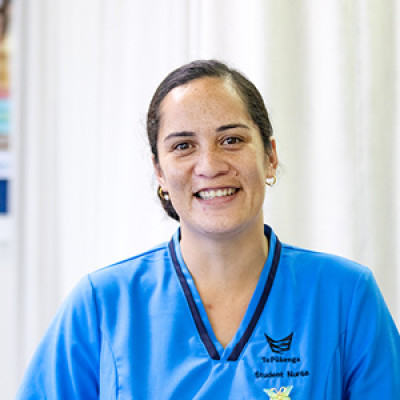Bachelor of Nursing
Course details
| NZQF Level | 7 |
|---|
About the course
On successful completion of the Bachelor of Nursing degree, you are supported through the process of registration with the Nursing Council of New Zealand.
Benefit from small classes, dedicated clinically experienced tutors and regular time in our modern clinical skills lab, Pokapu Whaihanga, where you put your new clinical skills into practice.
You will learn how to:
- Meet the Nursing Council of New Zealand competencies for the registered burse scope of practice.
- Practise safe, caring, effective and competent nursing., at a beginning Registered Burse (RN) level, in a variety of healthcare settings and environments.
- Articulate the place of Te Tiriti o Waitangi/the Treaty of Waitangi in healthcare delivery and nursing practice.
- Practise in a culturally safe manner that reflects a broad understanding of health and wellness.
- Analyse the impact of historical, cultural, political, social, economic and environmental influences on health and nursing practice.
- Incorporate self-authorship, critical thinking, clinical reasoning and problem-solving capabilities into your nursing practice.
- Effectively apply a range of theories, frameworks and models in theory daily practice with individuals, families, whānau and communities.
- Apply a comprehensive health assessment within the individual's family, whānau and community.
- Communicate effectively and develop effective therapeutic partnerships and actions with individuals, families, whānau and communities.
- Be collaborative and respectful with interprofessional colleagues.
- Lead and manage within the context of registered nurse scope of practice.
- Act professionally, and in a caring manner, by incorporating respect for, and valuing diversity of, life choices and health options.
- Enhance their professional development through lifelong learning.
Courses

Since achieving the Level 4 Study and Career Preparation with North Tec I had found it hard to start my Bachelor of Nursing degree due to accessibility issues and family circumstances. I relocated to Taranaki in late 2020 to support my family and because it gave me accessibility to study a Bachelor of Nursing programme with WITT. I have always been passionate about helping, supporting, and nurturing a person’s well-being holistically. I have been an advocate for human rights and my Māori culture and believe I have skills that can aide in bridging the health equity gap in healthcare.
I am grateful to WITT and the support systems they have set up to wrap around students and support us to succeed. As a nursing student at WITT, I have found that I have been well supported in all areas I have needed help with. I am grateful to WITT because I have all I need to graduate from WITT with a Bachelor of Nursing degree.
Lolz Anderson
Bachelor of Nursing
Entry Requirements
Programme Specific Information
The Bachelor of Nursing curriculum is underpinned by nursing values, educational goals and practice foci. In the twenty-first century the health needs of the person and family/whanau may be complex and diverse, set in a constantly changing health care environment. The two key values which inform the Bachelor of Nursing curriculum are the concepts of ‘partnership’ and ‘caring’.
Other key values which thread through your learning are health and wellness/hauora, relational practice, critical thinking, clinical decision-making, cultural safety and ethics/law.
Students will be in practice, either simulated or actual practice from the beginning of the programme. Time in practice increases throughout the programme and then becomes blocks of practice to prepare the graduate for the workplace. There are also opportunities for students to choose some specialty areas of practice. Shift patterns of early/lates and weekends commences at end of year one.
Clinical Skills Lab work:
The Clinical Skills Lab provides an environment for practicing techniques and learning clinical experiences. Simulation time is timetabled most weeks. Students must wear uniform for all clinical skills sessions and clinical practice placements.
Tutorials:
These are provided regularly for small groups of students to discuss aspects of their learning journey. Students will explore and reflect on practice as well as learning issues. All students are required to attend the majority of tutorials.
Blended learning:
Students will have the opportunity to undertake their learning using a variety of methods including:
- Lectures
- Online activities
- Debates
- Science lab work
- E-Portfolios
Classroom hours may be from 8:30am to 5:00pm. Students will be expected to be able to undertake 40 hours per week of study. Where possible the programme timetable allows for holidays that coincide with school holidays, however this is not always possible due to the clinical practice placement requirements.
Additional expenses
Closer to the programme starting, learners will receive a list of course materials to purchase. Examples of course materials could include textbooks, stationery, printing; uniforms, personal protective equipment, tools and a laptop.
Career Opportunities
Registered Nurses in New Zealand may work in any area of nursing practice: for example, mental health, acute care, community and aged care settings. Graduates must pass the Nursing Council of New Zealand registration exams to become a registered nurse.
Changes for new learners
WITT and this programme are part of Te Pūkenga – New Zealand Institute of Skills and Technology.
Similar Programmes
About the provider
The Western Institute of Technology at Taranaki (WITT) is a quality Government-owned tertiary education institution based in New Zealand's cultural and surfing hub. Taranaki is a beautiful region defined by its wonderful snow-capped mountain, extensive coastline, great surfing and many opportunities for outdoor activities. WITT is the only state tertiary institution in Taranaki and offers courses from certificate to degree level across a wide range of areas, including Business, Nursing, Hospitality, Te Reo Māori, Humanities, Media, Art, Electrical, Engineering, Automotive, Welding, Carpentry, Architecture, Computing, Fitness, Hairdressing, Beauty Therapy, Make-up Artistry, Social Sciences and Agriculture. WITT also specialises in English language tuition and foundation programmes for overseas students.
